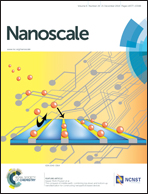General design of hollow porous CoFe2O4 nanocubes from metal–organic frameworks with extraordinary lithium storage†
Abstract
Hollow porous CoFe2O4 nanocubes from metal–organic frameworks were fabricated through a general facile strategy. The intrinsic hollow nanostructure can shorten the lengths for both electronic and ionic transport, enlarge the surface area of electrodes, and improve accommodation of the volume change during Li insertion/extraction cycling. The hybrid multi-elements characteristics allow the volume change to take place in a stepwise manner during the electrochemical cycle. Therefore, the as-prepared CoFe2O4 electrode exhibits outstanding performance as anode materials for lithium ion batteries. The stable capacity arrives at 815 mA h g−1 for 20 C. Subsequently, a specific capacity of ca. 1043 mA h g−1 is recovered when the current rate reduces back to 1 C after 200 cycles. This general strategy may shed light on a new avenue for large-scale synthesis of hollow porous hybrid nanocubes via MOFs for energy storage, environmental remediation and other novel applications.


 Please wait while we load your content...
Please wait while we load your content...